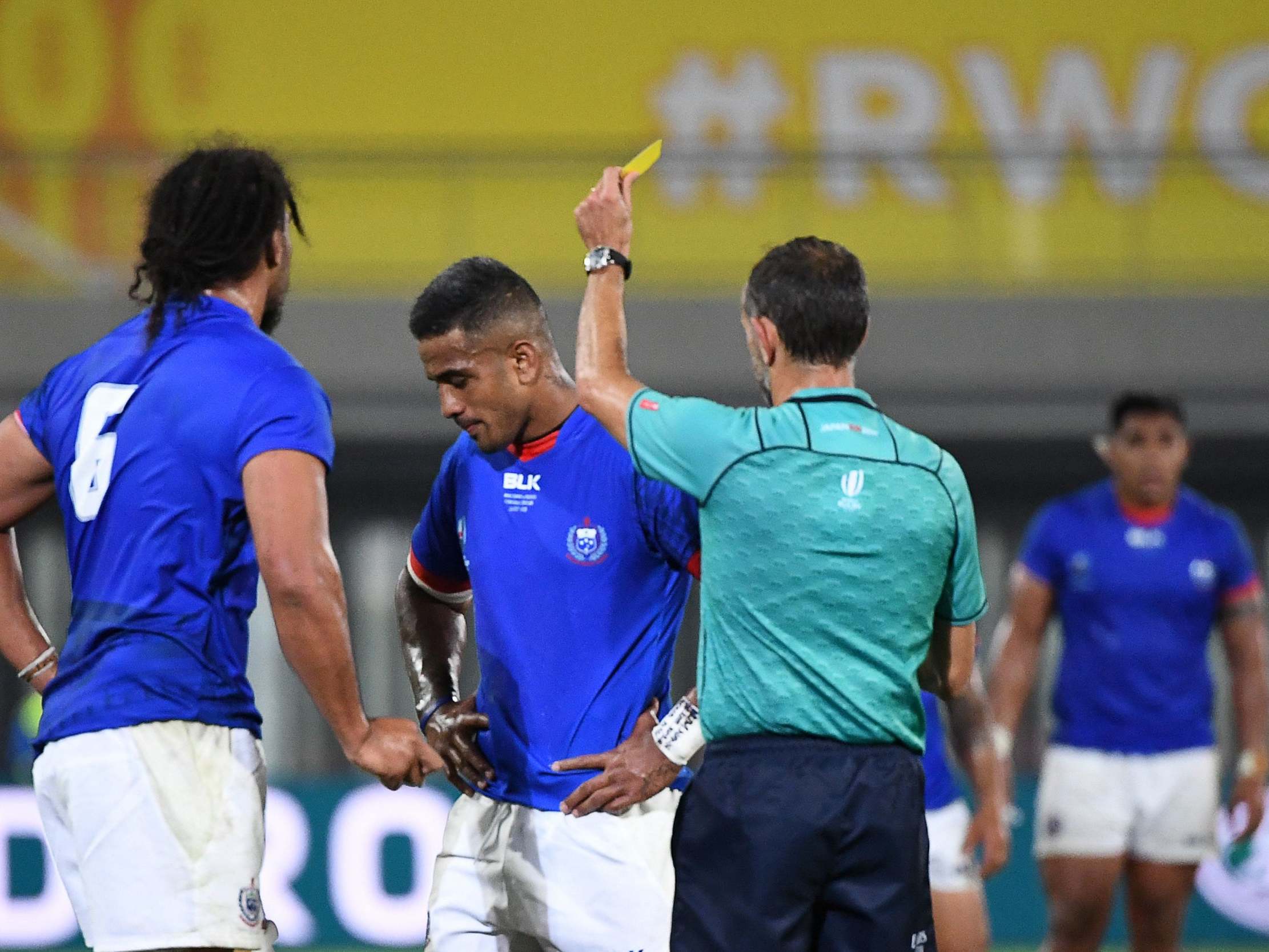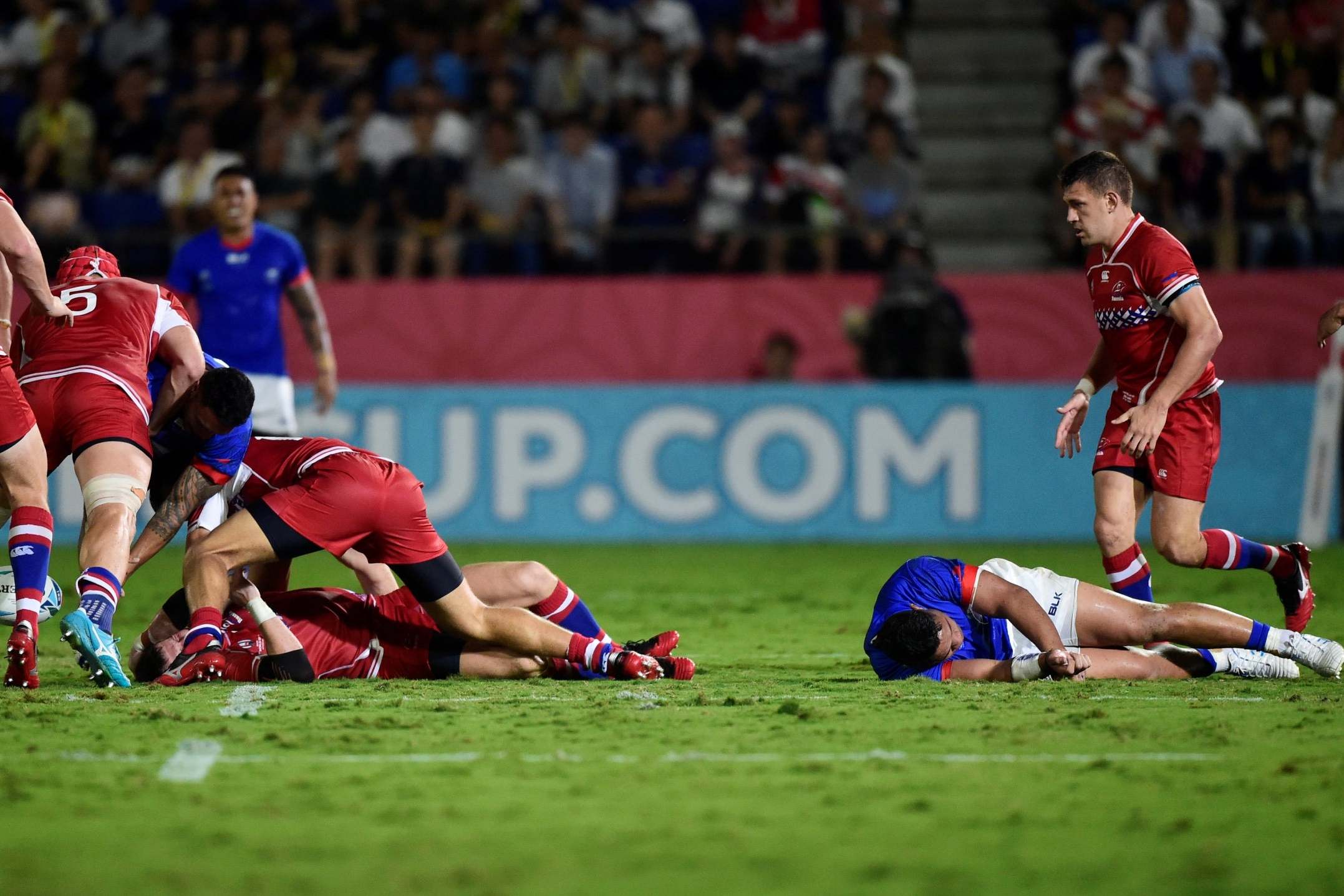World Rugby statement descends into farce as Romain Poite accused of ‘finding a way out rather than protect the players’
Extraordinary World Rugby statement criticising the standard of refereeing at the World Cup came an hour before two more high-profile incidents during Samoa’s 34-9 victory over Russia saw Poite fail to red card two high tackles

World Rugby’s extraordinary statement on the performance of officials at the Rugby World Cup descended into farce on Tuesday, after referee Romain Poite failed to issue red cards for two dangerous tackles in three minutes during Samoa’s victory over Russia, leading to allegations that they are “trying to find a way out rather than protect the players”.
An unprecedented clarification from World Rugby described the officiating over the course of the opening weekend in Japan as “not consistently of the standards set”, an admission that came from the match officials themselves after a number of controversial decisions across the first eight games.
But barely an hour after the statement landed, the game’s leading officials found themselves under-fire once again due to Poite’s handling of the two incidents in Tuesday’s match.
The first saw Samoan centre Rey Lee-Lo hit Russian captain Vasily Artemyev in the head with his shoulder, before hooker Motu Matu’u then collided with Artemyev again three minutes later, this time in a head-to-head impact that knocked the Samoan out.
One both occasions, Poite referred the incident to English TMO Graham Hughes. When discussing Lee-Lo’s tackle, the French referee indicated that he felt it warranted a red card, only for Hughes to talk him down by asking if there were any mitigating circumstances. Poite reconsidered his view and deemed that Artemyev has ducked into the tackle, resulting in the contact to the head.
Lee-Lo was instead yellow carded, yet full-back Artemyev was then hit with a much more forceful tackle three minutes later by Matu’u in a head-to-head collision. Again, Poite referred the tackle to TMO Hughes, but the decision once again came back as a yellow card. The farce didn’t end there, as Matu’u appeared to knock himself unconscious, such was the force of the collision, yet was not removed from the game until he failed a Head Injury Assessment some time later and was subsequently replaced when he was due to return to the field. Under World Rugby protocols, any player suspected of losing consciousness should be immediately removed from the game.
ITV’s television pundits Gareth Thomas, Maggie Alphonsi and Michael Lynagh hit out at the handling of the two tackles, and in light of the World Rugby statement criticised Poite and Hughes, with Thomas in particular claiming the uncertainty now surrounding the sanctioning of high and dangerous tackles leaves a “grey area”.
“Because we came into it going into a grey area – before it used to be black and white but then people would say ‘it shouldn’t have been sent off’ – now everybody is in this grey area and they don’t know what to do,” said former Wales and Lions captain Thomas. “It’s like they’re trying to find a way out, rather than protect the players.”
Former Women’s World Cup winner Alphonsi took aim at the Samoan players for using an illegal tackling technique, and echoed Thomas’s thoughts on referees now looking for ways out of the big controversial decisions.
“I think the challenge that we’ve seen from Samoa is they are leading with their shoulders, and we’ve seen it with quite a few tackles in the game,” Alphonsi said. “They’ve gone in with the shoulder, they’ve deliberately looked for that big hit, they don’t go low and as a tackler it’s your responsibility to dip yourself.

“As far as I can see with both of those incidents, they’re both red cards because the players [tacklers] could have easily dipped.
“Romain Poite, when he was talking it through, said ‘what’s the first contact? It was around the neck-to-head area’. Then he said the next point of ‘was it dangerous?’ and yes it was. Then what upset me the most is when the TMO chipped in. They’re supposed to challenge, I get that, but then the TMO said ‘was there mitigating circumstances?’ and that’s when I think Romain Poite has gone ‘right he might have dipped’. It’s like they’re finding something not to give a red card.”
Lynagh, another former World Cup winner, detailed how dangerous Lee-Lo’s challenge was. “I think the key is the second question: is there danger? And there is danger in that. There’s got to be some responsibility on the tackler. I don’t think the guy is dipping at all, he’s bending down waiting to take the hit, and the hit’s just come through very, very hard.”
On Matu’u’s challenge, he added: “The second one, I think this is all day a red card. Matu’u has knocked himself out, it’s quite clear there that he’s knocked himself out, he shouldn’t be on the field.”

World Rugby issued the statement before kick-off after a number of controversial incidents were highlighted in the wake of the opening round of fixtures, most notably the tackle from Australia wing Reece Hodge on Fiji’s Peceli Yato that left him concussed and resulted in a post-match citing, despite match referee Ben O’Keeffe and TMO Rowan Kitt insisting at the time that his tackle was legal.
O’Keeffe was also heavily criticised on social media for issuing a yellow card to Fiji centre Levani Botia, despite a video of the breakdown in question showing Wallabies captain Michael Hooper committing an offence by coming in at the side to clear him out.
The incident followed a similar one in Japan’s victory over Russia in Friday night’s curtain-raiser, when Japan lock James Moore escaped action for a no-arm tackle on Russia’s Vasily Dorofeev that was referenced on social media by former Namibia captain Jacques Burger as “looks like the officials missed a potential red card”.
And on Saturday, Scotland’s Hamish Watson suffered a World Cup-ending knee injury in an illegal clearout against Ireland.
“Following the usual review of matches, the match officials team recognise that performances over the opening weekend of Rugby World Cup 2019 were not consistently of the standards set by World Rugby and themselves, but World “Rugby is confident of the highest standards of officiating moving forward,” a World Rugby statement read.
“Elite match officials are required to make decisions in complex, high-pressure situations and there have been initial challenges with the use of technology and team communication, which have impacted decision-making. These are already being addressed by the team of 23 match officials to enhance consistency.
“Given this proactive approach, a strong team ethic and a superb support structure, World Rugby has every confidence in the team to ensure that Rugby World Cup 2019 delivers the highest levels of accurate, clear and consistent decision-making.”
Join our commenting forum
Join thought-provoking conversations, follow other Independent readers and see their replies
Comments